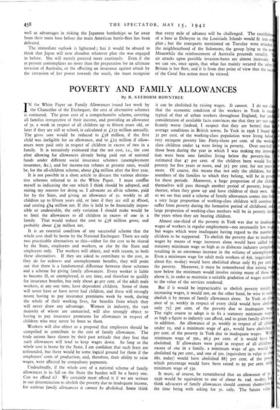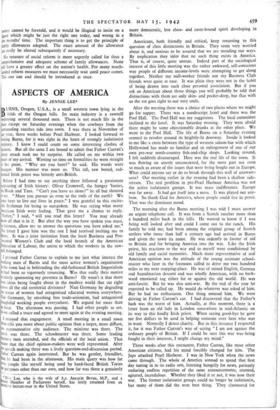POVERTY AND FAMILY ALLOWANCES
By B. S EEBOHM ROWNTREE
IN the White Paper on Family Allowances issued last week by the Chancellor of the Exchequer, the cost of alternative schemes is estimated. The gross cost of a comprehensilre scheme, covering all families irrespective of their income, and providing an allowance of 5s. a week in respect of all children up to fifteen years old, or later if they are still at school, is calculated at £132 million annually. The gross cost would be reduced to £58 million, if the first child was ineligible for an allowance, and to £23 million if allow- ances were paid only in respect of children in excess of two in a family. It is tentatively estimated that the net cost, i.e., the cost after allowing for allowances already being paid out of national funds under different social insurance schemes (unemployment insurance, &c.), and for income-tax rebates at present rates, would be, for the all-children scheme, about £64 million after the first year.
It is not possible in a short article to discuss the various alterna- tive schemes referred to in the White Paper. I must confine myself to indicating the one which I think should be adopted, and stating my reasons for doing so. I advocate an all-in scheme, paid for by the State, and giving an allowance of 5s. weekly to all children up to fifteen years old, or later if they are still at school, and costing £64 million net. If this is held to be financially impos- sible or undesirable, the only variation I should make would be to limit the allowances to all children in excess of one in a family. That would reduce the cost to £58 million gross; and probably about £39 million net.
It is an essential condition of any successful scheme that the whole cost shall be borne by the National Exchequer. There are only two practicable alternatives to this—either for the cost to be shared by the State, employers and workers, or else by the State and employers only. The workers will object, and with reason, to both these alternatives. If they are asked to contribute to the cost, as they do for sickness and unemployment benefits, they will point out that there is a fundamental difference between these schemes and a scheme for giving family allowances. Every worker is liable to become ill, or unemployed, at any time, and therefore to qualify for insurance benefits, but only about 4o per cent. of the adult male workers, at any one time, have dependent children. Some of them will never have or have never had children, and these will strongly resent having to pay insurance premiums week by week, during the whole of their working lives, for benefits from which they will never draw any advantage. Women in industry, the vast majority of whom are unmarried, will also strongly object to having to pay insurance premiums for allowances in respect of children who may never be born to them.
Workers will also object to a proposal that employers should be compelled to contribute to the cost of family allowances. The trade unions have shown by their past attitude that they fear that such allowances will tend to keep wages down. So long as the whole cost is borne by the State, I am confident that such fears are unfounded, but there would be some logical ground for them if the employers' costs of production, and, therefore, their ability to raise wages, were affected by compulsory payments.
Undoubtedly, if the whole cost of a national scheme of family allowances is to fall on the State the burden will be a heavy one. Can we afford it? We certainly must afford it if we are serious in our determination to abolish the poverty due to inadequate income, for without family allowances it cannot be abolished. Some think
it can be abolished .by raising wages. It cannot. I do not c that the economic condition of the workers in York is exa typical of that of urban workers throughout England, but car consideration of available facts convinces me that they are not si ficantly worse (indeed, I suspect that they are better) than average conditions in British towns. In York in 1936 I found 3x per cent. of the working-class population were living belo very stringent poverty line. Forty-three per cent. of the work( class children under 14 were living in poverty. Over one-half those born during the year in which I was making my invest tion were born into families living below the poverty-line. estimated that 47 per cent. of the children born would live poverty for five years or more, and 311 per cent. for ten years more. Of course, this means that not only the children, but members of the families to which they belong, will be in pm for those periods. Moreover, a large proportion of the child themselves will pass through another period of poverty, longer shorter, when they grow up and have children of their own. so we see that until a scheme of family allowances comes into fo a very large proportion of working-class children will continue suffer from poverty during the formative period of childhood, an large proportion of working-class mothers will be in poverty d the years when they are bearing children.
Almost one-third of the poverty in York was due to inadeq ho wages of workers in regular employment—not necessarily low wa but wages which were inadequate having regard to the number children to be supported. To abolish the poverty due to inadeq wages by means of wage increases alone would have called fo statutory minimum wage so high as to dislocate industry complet resulting in an enormous increase in the volume of unemploym• au Even a minimum wage for adult male workers of 63%. (equivalen about 85s. to-day) would have abolished about only 83 per cent. the poverty. Moreover, it must be remembered that raising IA now below the minimum would involve raising many of those above it, in order to maintain a suitable gradation of wages actor to the value of the services rendered.
But if it would be impracticable to abolish poverty merely increasing wages, it would not, on the other hand, be wise to see abolish it by means of family allowances alone. In York an all ance of 5s. weekly in respect of every child would have abolis only 72f per cent. of the poverty due to inadequate wa The right course to adopt is to fix a statutory minimum wag as high a figure as industry can afford, and to grant family allowa in addition. An allowance of 5s. weekly in respect of all child under is, and a minimum wage of 45s., would have abolished per cent. of the poverty in York due to inadequate wages. WI minimum wage of sos., 96.3 per cent. of it would have abolished. If allowances were paid in respect of all children excess of one in a family, a minimum wage of 45s. would h abolished 64 per cent., and one of 5os. (equivalent in value to a 68s. today) would have abolished 88+ per cent. of the pasce which percentage would have been raised to 95 per cent. Iv] minimum wage of 53s.
It must, of course, be remembered that an allowance of 55. 1936 would be equivalent to one of about 6s. iod. to-day, b think advocates of family allowances should content themselves the time being with asking for 5s. only. The future value looney cannot be foretold, and it would be illogical to insist on a figure which might be just the right one today, and wrong in a
months' time. The important thing is to get the principle of wily allowances adopted. The exact amount of the allowance ran easily be altered subsequently if necessary.
No measure of social reform is more urgently called for than a comprehensive and adequate scheme of family allowances. None till have a greater effect on the nation's health. For many much- jaded reform measures we must necessarily wait until peace comes. 'This one can and should be introduced at once.



























 Previous page
Previous page